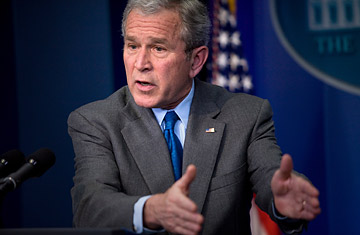
President George W. Bush speaks during a press conference at the White House February 28, 2008, in Washington, D.C.
President George W. Bush warned on Thursday that U.S. telephone companies won't help the government in the war on terror if they are facing lawsuits from Americans who claim to have been spied on. "How can you listen to the enemy if the phone companies aren't going to participate with you?" Bush said in an impassioned news conference. "And they're not going to participate if they get sued." Bush was urging Congress to pass a new law that would give the companies immunity from prosecution on eavesdropping charges. "I just can't tell you how important it is to not alienate, or not discourage, these phone companies."
AT&T and Verizon face some 40 lawsuits, consolidated into five cases, alleging they helped the government wiretap Americans in the wake of 9/11. It has been reported that the companies are declining to help with wiretaps as a result. But Democrats have repeatedly offered to pass a bill that gives telecoms immunity for cooperation with government security efforts; the standoff revolves around whether that immunity should be retroactive.
"Democrats have always supported prospective, 'from-here-forward' liability protection for companies," says Jim Manley, spokesman for Senate majority leader Harry Reid. "Prospective immunity is not in dispute," says Brendan Daly, spokesman for Nancy Pelosi. The argument is over the White House call for immunity to be extended for any eavesdropping the companies may have done in the past at the government's behest. Bush has said he'll veto any bill that doesn't include retroactive immunity; Democrats are refusing to offer it.
The telecom companies decline to comment on any matters relating to national security, so it's impossible to get their side of the story. But the White House is suggesting that the lawsuits could be a crippling financial blow to these companies. "A judgment for the plaintiffs' lawyers could be the death knell for the companies," says White House spokesperson Dana Perino. "Alternatively, Americans will be paying higher phone bills."
Wall Street, however, doesn't appear to be buying this argument. "From an investor perspective it's never been about whether the telecom companies would face financial damage," telecom analyst Blair Levin told Dow Jones' MarketWatch. Another telecom analyst told the business wire, "Quantifying the impact would be pretty tough to do." AT&T's current annual report doesn't mention the eavesdropping cases or their potential financial impact.
The President's more compelling argument for retroactive immunity is that the telephone companies acted in good faith in response to a government request during a moment of crisis. The Administration had told the companies that it was legal to help with eavesdropping, even without a warrant from a secret court, and keeping the word of the government is important to maintain the credibility of any White House in future crises. "They were told what they were going to do was legal," Bush said at his press conference.
Critics counter that it is the courts, not the executive branch, that determine what does and does not comply with the law. But if a court concludes that the companies acted out of patriotic motives, even if it's determined the wiretapping is against the law, a massive punitive damage award is unlikely. What's more, if White House credibility is the issue, critics of retroactive immunity argue that offering prospective immunity should be sufficient.
Still, the Administration argues passionately for retroactive immunity. Says White House spokesperson Perino: "A wide bipartisan group of Senators and a majority of the House, if given a chance, believe that the companies acted in good faith. Only trial lawyers and their allies in the House, who have received millions of dollars in contributions from class-action lawyers, argue differently, and that's because they're putting greed ahead of fairness and national security." (In fact, the cases have been brought by non-profit civil liberties groups.)
For now the issue remains stalemated, although G.O.P. lawmakers have agreed to meet with their Democratic counterparts in a bipartisan, bicameral conference to seek a compromise. Previously Democrats have offered to grant retroactive immunity to the telecoms if the Administration accepts liability and lets the cases proceed. Another possible compromise would let a secret intelligence court decide whether the companies acted improperly.
